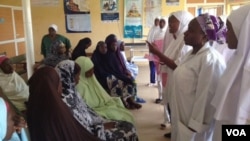An association of doctors in Nigeria said the government must do more to improve access and affordability of health care in Africa’s most populous country.
At a meeting held last week, the Nigerian Medical Association called for the government to levy a tax on cigarettes, alcohol and cellphone credits.
Nigerian Medical Association president Kayode Obembe said Nigeria’s doctors are overstretched. He estimated there is one doctor for every 6,000 patients in Nigeria — a ratio far and above World Health Organization recommendations.
National health insurance
Obembe said that money could pay for a national health insurance plan so poor people can afford preventative medical care.
And many of Nigeria’s medical school graduates go overseas, he said. Those that stay in the country tend to live in cities, not in the rural areas where they also are needed.
“We still need to put more efforts so that we can get more doctors. And not just getting more doctors, to ensure that they are evenly distributed to take care of every part of the community,” said Obembe.
Samuel Olomakan is a doctor in the northern city of Kaduna who teaches at a local medical school. He said doctors in Nigeria are poorly paid and hospitals lack proper equipment. Many doctors decide they would rather work in another country.
“Some of them don’t like to work at home, because even the country itself cannot meet up with their needs, salary and other things,” he said.
Doctors needed
Olomakan said even though some people want to be doctors, however, the high cost of education and training keeps many people from going to medical school.
“We are calling the federal government to help us, to be given admission as much as possible so that the doctors, the numbers of doctors in Nigeria will increase, and all these challenges we are facing will be reduced,” he said.
The end result is that people in rural areas who lack access to doctors often rely on family members or poorly trained pharmacists when they get sick, according to Olomakan.










